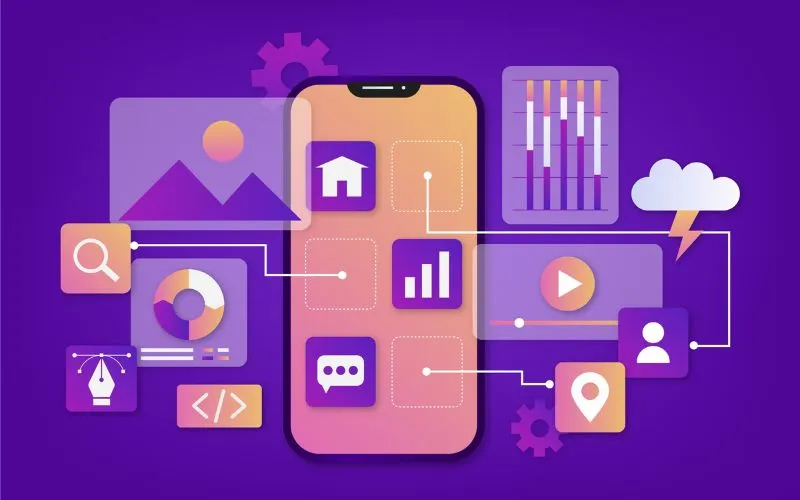In today’s digital-first world, businesses across industries are leveraging mobile app development services to enhance customer engagement, streamline operations, and drive revenue. With the rise of advanced technologies like artificial intelligence, cloud computing, and 5G, mobile app development is evolving at an unprecedented pace. However, developing a successful mobile application involves more than just coding—it requires a strategic approach, user-centric design, and continuous innovation.
This blog delves into the latest trends, challenges, and best practices in mobile app development, providing insights for businesses and developers alike.
The Latest Trends in Mobile App Development
Mobile technology is rapidly changing, and staying ahead of the curve is crucial for businesses looking to create impactful apps. Here are some key trends shaping the future of mobile app development services:
1. AI and Machine Learning Integration
Artificial Intelligence (AI) and Machine Learning (ML) are transforming mobile apps by enabling smarter functionalities such as personalized recommendations, voice assistants, and chatbots. Apps like Netflix, Spotify, and Amazon leverage AI to enhance user experience by analyzing behavioral patterns and preferences.
2. 5G Technology and Enhanced Performance
With the global rollout of 5G, mobile apps can now operate with lightning-fast speed and minimal latency. This advancement opens up opportunities for augmented reality (AR), virtual reality (VR), and high-definition streaming apps that were previously limited by network constraints.
3. Cross-Platform Development
Developing separate apps for Android and iOS can be time-consuming and costly. Cross-platform development frameworks like Flutter and React Native allow developers to create apps that function seamlessly on multiple operating systems, reducing development costs and time-to-market.
4. Progressive Web Apps (PWAs)
PWAs are gaining popularity due to their ability to deliver a native app-like experience directly through a web browser. Businesses like Twitter, Pinterest, and Starbucks have successfully implemented PWAs to improve engagement and performance.
5. Blockchain for Security and Transparency
Blockchain technology is making waves in mobile app development by enhancing security, enabling secure transactions, and ensuring transparency. Industries like finance, healthcare, and supply chain management are incorporating blockchain-based applications to safeguard sensitive data.
6. IoT-Enabled Mobile Applications
The Internet of Things (IoT) is revolutionizing mobile apps by connecting devices and enabling remote control functionalities. From smart home automation to industrial IoT applications, the demand for IoT-powered mobile solutions is on the rise.
Challenges in Mobile App Development
While the industry is booming, developing a successful mobile application comes with its own set of challenges. Here are some common hurdles businesses face when investing in mobile app development services:
1. Platform Compatibility Issues
With multiple operating systems, screen sizes, and device specifications, ensuring seamless compatibility across all platforms can be challenging. Developers must conduct thorough testing to avoid performance issues.
2. Security and Data Privacy Concerns
Cybersecurity threats are increasing, making it imperative for developers to implement robust security measures. Encrypting user data, using secure APIs, and ensuring compliance with regulations like GDPR and CCPA are essential.
3. App Store Approval Process
Both Google Play Store and Apple App Store have strict guidelines for app submission. Many developers face rejection due to non-compliance with policies, requiring them to make modifications and resubmit the app.
4. User Retention and Engagement
Launching an app is just the beginning—keeping users engaged is a bigger challenge. Businesses must focus on creating an intuitive user experience, providing regular updates, and implementing effective marketing strategies.
5. High Development and Maintenance Costs
Developing a high-quality mobile app requires substantial investment. Businesses must balance their budgets while ensuring that their app meets user expectations and market demands.
Best Practices for Successful Mobile App Development
To overcome challenges and build a successful mobile application, businesses should follow these best practices when utilizing mobile app development services:
1. Conduct Thorough Market Research
Understanding your target audience, their preferences, and competitors’ offerings can help you develop an app that meets user needs. Conduct surveys, analyze competitor apps, and define a clear value proposition.
2. Prioritize User Experience (UX) and User Interface (UI)
A well-designed app with intuitive navigation and visually appealing UI enhances user satisfaction. Focus on simplicity, consistency, and accessibility to ensure a seamless user experience.
3. Choose the Right Development Approach
Deciding between native, hybrid, or cross-platform development depends on your app’s requirements. Native apps offer the best performance, while hybrid and cross-platform approaches reduce development time and cost.
4. Implement Agile Development Methodology
Adopting an agile development approach allows teams to iterate quickly, incorporate user feedback, and release updates efficiently. Agile methodologies ensure flexibility and faster time-to-market.
5. Test Rigorously Before Launch
Conducting extensive testing, including usability testing, performance testing, and security testing, helps identify and fix potential issues before the app goes live. This ensures a smooth user experience and minimizes post-launch problems.
6. Optimize for App Store Rankings (ASO)
App Store Optimization (ASO) is crucial for increasing your app’s visibility. Use relevant keywords, write a compelling app description, include high-quality screenshots, and encourage positive reviews to boost rankings.
7. Plan for Continuous Improvement and Updates
The mobile app landscape is dynamic, and staying relevant requires continuous updates, feature enhancements, and performance optimizations based on user feedback.
Conclusion
Mobile applications have become an integral part of our daily lives, revolutionizing the way businesses interact with customers. With rapid technological advancements and evolving user expectations, businesses must stay updated with the latest trends, tackle development challenges, and adopt best practices to create impactful mobile apps.
By leveraging professional mobile app development services, businesses can build high-performing, user-friendly, and scalable applications that drive growth and success in the digital era. Whether you’re a startup or an established enterprise, investing in a well-planned mobile app strategy can give you a competitive edge in the market.
For more interesting blogs click here.

